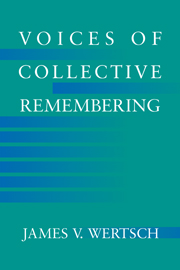Book contents
- Frontmatter
- Contents
- Introduction and Acknowledgments
- 1 An Encounter with Collective Memory
- 2 Methodological Preliminaries to the Study of Collective Remembering
- 3 Collective Memory: A Term in Search of a Meaning
- 4 State Production of Official Historical Narratives
- 5 Narrative Dialogicality and Narrative Templates in the Production of Official Collective Memory
- 6 The Consumption of Historical Narratives
- 7 Generational Differences in Collective Remembering
- Conclusion
- References
- Index
3 - Collective Memory: A Term in Search of a Meaning
Published online by Cambridge University Press: 08 January 2010
- Frontmatter
- Contents
- Introduction and Acknowledgments
- 1 An Encounter with Collective Memory
- 2 Methodological Preliminaries to the Study of Collective Remembering
- 3 Collective Memory: A Term in Search of a Meaning
- 4 State Production of Official Historical Narratives
- 5 Narrative Dialogicality and Narrative Templates in the Production of Official Collective Memory
- 6 The Consumption of Historical Narratives
- 7 Generational Differences in Collective Remembering
- Conclusion
- References
- Index
Summary
In this chapter, I outline the meaning of several key terms that surface repeatedly in discussions of collective remembering. By beginning with how others have treated these terms, I hope to clarify my own line of reasoning and its relationship to a broader conceptual framework. I shall organize this review around the broad categories of “memory,” “collective memory,” “narratives as cultural tools,” and “textual community.”
Memory
Nora's dictum that “we speak so much of memory because there is so little of it left” (1989, p. 7) seems quite apropos when trying to account for today's widespread concern, if not anxiety, about the issue. Whatever the motivation, memory is a major topic of discussion both in the public sphere and in specialized academic disciplines such as psychology, neuroscience, sociology, anthropology, and history. Indeed, in today's world, we have what Klein (2000) has called a “memory industry” (p. 127).
One upshot of being at the center of myriad debates is that the term “memory” has come to be understood in many different ways. The elasticity, if not fragmentation, of its meaning has been exacerbated by the rhetorical uses to which it has been put, a point that led John Gillis (1994b) to argue that it may be “losing precise meaning in proportion to its growing rhetorical power” (p. 3).
It is not obvious how to catalogue all the interpretations of memory that nowclutter the conceptual landscape, especially since these interpretations often exist in the form of implicit assumptions rather than explicit formulation. Differences there are, however, and they have a profound effect on how memory is discussed and how participants in this discussion understand – and misunderstand – one another.
- Type
- Chapter
- Information
- Voices of Collective Remembering , pp. 30 - 66Publisher: Cambridge University PressPrint publication year: 2002



